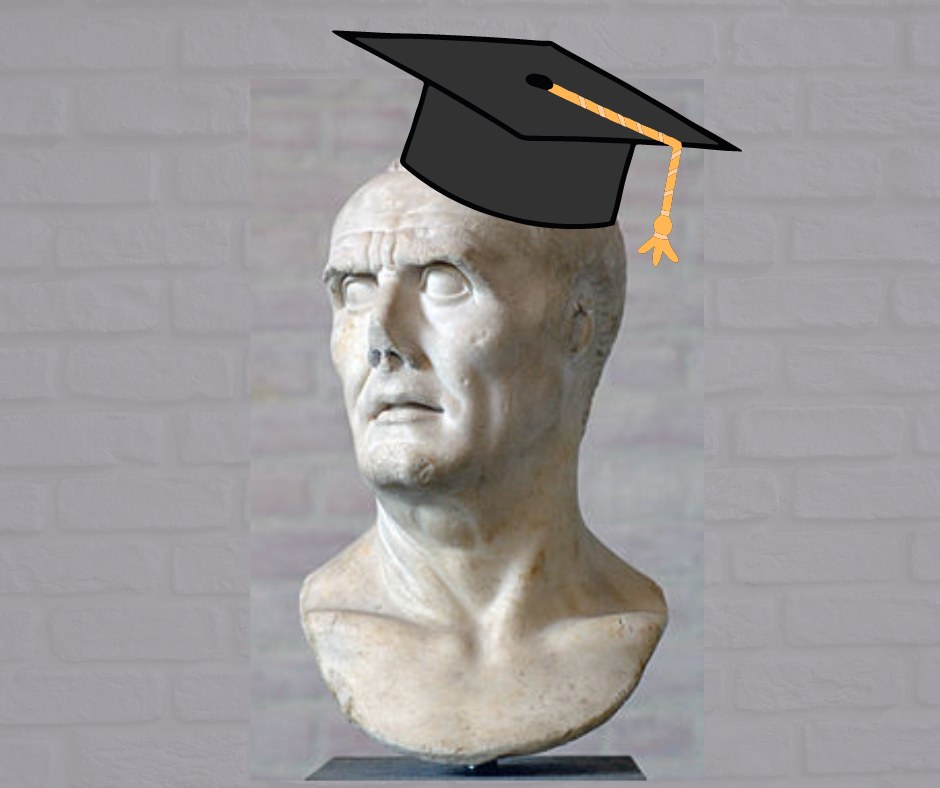Teaching first-generation college students
When I delved into scholarship on supporting first-gen college students, I thought about Marius and the Roman "new man" trope. They turned a potential deficit into an asset, and a core aspect of their identity.

My favorite research subject Cicero was proud to call himself a "new man," a politician who was the first person in his family's history to win election to the consulship (the highest political office in Rome). In Rome's highly stratified society, this was a major achievement. My favorite take on the "new man" theme actually comes not from Cicero but from Gaius Marius, in Sallust's Jugurthine War:
My fellow citizens, compare me, a new man, with their arrogance. What they usually hear or read, I have seen in some cases, or done myself in others. What they learn from books, I learned by soldiering. Weigh for yourselves whether deeds or words are worth more. They look down on my lack of pedigree; I look down on their idleness. They throw my lack of fortune in my face; I criticize their shameful behavior. ... I can't gain credibility by showing off my ancestors' portraits or how many triumphs or consulships they won, but if necessary, I can show you spears, a standard, medals, other military decorations, and the scars on the front of my body. Those are my ancestors, that's my nobility, not left to me as an inheritance as theirs was, but the reward of the many challenges and dangers I've faced. (Jugurthine War 85)
Marius, like Cicero, saw himself as a self-made man without the advantage of a long pedigree of distinguished ancestors. This deficit turned into a point of pride and a key component of each man's identity and self-image. They didn't have to wonder if they only achieved their position thanks to heredity; they knew how hard they'd worked to get it.
When I delved into scholarship on supporting first-gen college students (students whose parents either didn't go to college or didn't finish a 4-year degree, depending on who you ask), I thought about this Roman "new man" trope.
Being a first-gen college student in the 21st century is a struggle for many, and may leave scars, as Marius suggests. In 2008, the Pell Institute (whose Pell grants support many first-gen and low-income students) put out a report authored by Vincent Tinto and Jennifer Engle that rang some alarm bells: colleges had made strides in increasing the access of first-gen college students to a bachelor's degree (a third to half of all college students are first-gen), but not so much in supporting the success of these students in achieving that degree within four or even six years. They found that high-income students were 6 times more likely to earn a four-year degree, compared with low-income students, and that the gap was growing. A 2018 report showed a similar gap.
This gap persisted even when Engle and Tinto controlled for enrollment characteristics and college preparation, which, they explain, "suggests that the problem is as much the result of the experiences these students have during college as it is attributable to the experiences they have before they enroll." Many of these students made a huge financial gamble just to get to college, taking on a staggering amount of debt that they'd be left with whether or not they actually attained that degree that would help them make higher wages to pay it off. Colleges' climates seemed to be tilting the odds even further against these students, instead of helping them to beat the odds.
What is distinctive about first-gen college students?
Research shows that first-gen students usually have low levels of "engagement" in campus life, because they are much more likely to live off campus, and much more likely to leave campus on a regular basis to work, to make enough money to stay in school. That low level of engagement (and lack of time for studying) has a negative impact on their performance in classes, and on their mental health. While they're working, their classmates are bonding and joining campus organizations and eating out and building a social network. Stipends and increased financial aid are by far the easiest solutions to this problem.
On the other hand, first-gen students typically have a high level of "engagement" when it comes to civic, community, and family ties. For the most part, they have high degrees of cultural wealth or community capital, to use Tara Yosso's term. However, I think it's important to be mindful of the crucial distinction between first-gen students whose families are thrilled to send their kids to college so that they can improve the prospects of the whole family, and other students whose families feel resentful that their kids seem to be looking down on and abandoning the culture they grew up in to seek prestige. In either case, first-gen students are typically very highly motivated to succeed in college (although this may or may not mean getting A's, as Christine Oh and Nadia Kim note) so that they can go back to improve their home communities, empower younger siblings or relatives to go to college, support their families financially, and/or make the world a better place. That high motivation can help to make up for a lack of family support when it comes to navigating complicated institutions, but it also adds a lot of pressure.
Because public school funding is tied to property taxes in the U.S., the best schools with the best-paid teachers, the best computers, and the biggest AP or IB programs are rarely in the districts where a majority of residents are low-income or people of color. When students graduate from under-resourced high schools to go to college, it's a testament to their hard work and determination. But they may not have encountered academic writing assignments, long reading assignments, and jargon until they arrive on campus, all while going through the culture shock that all first-year college students experience. They haven't had the same practice as their peers, and don't have the same frame of reference. So when professors aren't clear about the parameters and grading criteria for assignments, or when they don't offer support to students to help them master course content, this has a disproportionately negative effect on first-gen students, especially first-gen low-income (often abbreviated FGLI) students.
Supporting first-gen students in the classroom
Frankly, as I read about this subject, it seemed to me that best practices for supporting first-gen students in the classroom are almost identical to the Universal Design for Learning Guidelines (a good testament to their universality!). I was also reminded about my reading on the topic of academic writing: it's actually a lack of clarity and transparency from us, the professors, that often gets in the way of good student writing assignments. Here are some more important ways to support first-gen students, as faculty.
- Have students work together
At Berkeley in the 1980s, calculus professor Uri Treisman decided to run a study on first-year calculus students, to figure out why students of color (many first-gen) weren't doing well in their courses. When he began, he thought that the students weren't trying hard enough – but the opposite turned out to be true.
It is not as if our Black students thought to themselves, "Well, there's nothing happening on the streets, so let's go to Harvard, Caltech, Princeton or Berkeley." These students were admitted to one of the premier research universities in the United States, and we had presumed that their problem was motivation! Many of the inner-city students were socially isolated throughout high school; they paid a very, very high price to get to Berkeley. These kids were motivated!
Treisman found that his students of color were working for as many hours, if not more, than his white students. The difference was that they were working alone. They didn't benefit from talking about their work with classmates, which turned out to be an important complement to "study time." Treisman's solution was to create workshops – open to all students – where students worked collaboratively in groups used calculus to solve real-world problems. The improvement was astonishing, and many other institutions followed suit in setting up similar models.
After Engle and Tinto's paper came out in 2008, many institutions established first-year seminars, learning communities, and community-building programs for first-gen students, in an effort to provide opportunities for the kind of collaborative learning that is so beneficial for first-gen students. Jose Sánchez, who went through Yale's First-Year Scholars program and then worked as a mentor for other FGLI students, speaks powerfully about the impact of the program in his capstone essay. Small-group learning activities in class can help first-gen (and other) students to build those social bonds that will help them learn, as George Kuh, Jillian Kinzie, and their colleagues at Indiana University found.
Vincent Tinto, one of the authors of the Pell Institute study, also found that collaborative learning could make the difference in helping first-gen students to persist in their college careers. "Though we have treated the issue of motivation to learn as largely an academic matter, one that is shaped by the academic environment of the classroom, learning is necessarily social in character," he wrote. He identified engagement and relevance as key factors in learning: engagement and interaction with others, including fellow students as well as faculty, and classroom content that is relevant to students' lives or career goals provide powerful support for this student population in particular (although almost all students probably benefit). Because first-gen students tend to be so engaged with their communities, working on real-world problems or on community-engaged learning projects is particularly likely to bring out their best.
- Talk to students one-on-one
Giving time to students, particularly first-gen students, is a powerful way for faculty to support them: that face time can help to create a sense of belonging and social capital, as well as supporting students' academic work. First-gen students are often particularly reluctant to speak up in class or to talk to faculty, whether it's because they don't feel entitled to professors' time, or because they often see visiting faculty during office hours as an admission of weakness or failure, a last resort. It's useful to clarify for all students what office hours are for, and to reach out to them to encourage them to stop in.
- "Unhide" the curriculum
Jay Dee and Cheryl Daly talk about how faculty can "help students decode the text of higher education so that they understand the norms and expectations of academic work within their college cultures." In their words, faculty can act as "cultural agents" helping students to find their footing in college, interpreting the "hidden curriculum" and providing the tacit knowledge that continuing-generation and white students often get from their parents. The hidden curriculum includes modes of class participation and study skills, too:
Learning how to participate in a class discussion, for example, involves gaining tacit knowledge. As students gain more experience in the classroom, they learn how to frame constructive responses to questions, pose new questions that pertain to the course’s learning objectives, and offer relevant information that builds on previous discussion. They also learn how to regulate their participation based on the current context of the discussion; that is, they understand when it is appropriate to ask questions, disagree with another viewpoint, or remain silent to allow others to join the dialogue.
When in doubt, say more about your expectations for students and grading criteria; be specific, detailed, and explicit.
- Have a growth mindset, and meet students halfway
Probably the most important way to support first-gen students? To believe that they can succeed. In a great 2016 article by Alfred Schademan and Maris Thompson, the authors recorded one professor who dismissed students for not being "ready" for his class, without trying to reach out to them or give them the support they needed to succeed (which his students certainly noticed, and which demotivated them further). By contrast, they also found professors who expressed compassion and a growth mindset. These professors said that they were willing to put a lot of special, individualized effort into helping under-prepared students succeed, as long as the students were willing to work hard as well:
I think it’s important to recognize that we all need help with something. So I try to key in to what people need from me as an instructor. And this is every class from my 400 level courses here at [State] to my classes at [North Community College]. What do you need as a human being and also as a student? But also how can I meet you halfway? My thing is fifty percent, because I think everyone needs to put in some work.
And I know that’s hard for students, some coming from night jobs and have a hard time staying awake. It’s whatever I can do to help them succeed … . On the other hand, you have to do the work and let me know what you need. I found that students really respect that. They don’t want to be coddled, they know they’re adults. They [are] like, “here’s the bar and I’ll help you get over the bar.”
Many of those students not only succeeded in the course but went on to become leaders on campus with newfound confidence.
Leila Ansari Ricci and Rebecca French from CSULA came up with similar findings in their 2023 paper: first-gen students wanted to do authentic work that was relevant to their lives and their career aspirations, and wanted to put in the work to succeed, but felt much more able to do that when they could tell that their professors wanted to help them. (I think this is true of all students, actually.) Something as simple as encouraging a student to keep writing, keep trying, keep expressing their opinions and perspective, can be transformative.
To bring us back full circle to Marius and Cicero, I think we need to keep in mind how proud they were (or claimed to be) of their status as "new men." They turned a potential deficit into an asset, and a core aspect of their identity. That's what I want for first-gen college students: to be proud of how far they've come and how high they've set their sights. Unlike Cicero, most of them don't have a family fortune to boost their careers. The absolute least we can do is to make sure that they aren't spending precious time and money on college classes where they don't feel welcome or supported.
Further reading
Jay R. Dee and Cheryl J Daly. 2012. “Engaging Faculty in the Process of Cultural Change in Support of Diverse Student Populations.” In Creating Campus Cultures, 1st ed., 168–88. Routledge.





